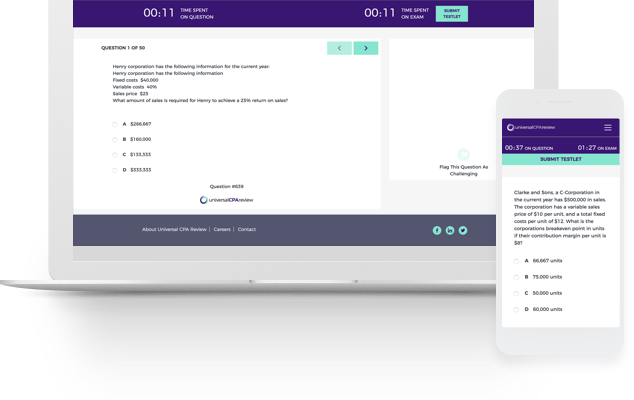Being adequately prepared and doing well on the multiple-choice section of the CPA exam means that you can leave more time, and room for error, for the simulations. This portion of each exam is worth 50% of a candidates test score and, in my opinion, is where the largest chunk of study time should be allocated. There are so many CPA review courses that enable candidates to obtain multiple-choice questions (sometimes free) so that on test day you can walk in confident that you can kill this part of the exam.

Repetition, Repetition, and More Repetition
The key to success regarding the multiple-choice portion of the test is repetition. Through repetition you will learn to quickly and efficiently identify key words and what the “ask” of the question is. Unlike CPA exam task based simulations, the odds are fairly high that you will see questions on the exams that you will have seen in your CPA exam review course. You don’t necessarily have to understand the concepts, but instead be able to match key words within the question to the correct answer choice. Through continuous repetition you will have the ability to quickly recognize the answer, saving more time for more difficult questions and simulations down the road. Commit to answering so many questions a day, and download an app on your phone so that you can flip through questions as you are waiting in line at the grocery store or during commercial breaks of your weekly show.
Time Management
Practice time management so that you leave yourself enough time to successfully complete the test. One question is not going to make or break your score; if you don’t know the answer give it your best guess and move on. You can always flag the questions you are unsure about and come back to them before you submit each testlet, but don’t sit and spin your wheels on one question. Additionally, make sure to answer all questions. There is no way to earn points from unanswered questions, but if you at least take a shot-in-the-dark guess you are giving yourself a 25% chance of getting it correct.
Performance on Testlet No. 1 Matters
As you may know, your performance on the first testlet determines the difficulty of the second testlet. If you do well on the first, the second will be harder, and vice versa. However, I always tell candidates to try not to focus too much energy on this during the test, and if possible don’t even think about it at all. If it appears that the questions got easier on the second testlet, it’s only going to stress you out. Focus on the task at hand, and know that even if you didn’t do well on the first testlet, you can still pass.
Bottom Line
The multiple-choice section of each exam is where you will most likely earn the majority of your points. Through process of elimination and recognition of concepts you can master this section. In my opinion, the way you feel about the first half of the test plays a large role in how you do on the second half. Maintaining confidence in your abilities throughout the test is key to finding success. No matter what test you are taking you will start by completing the multiple-choice section, so make sure you set yourself up for success to leverage your confidence going into simulations.

